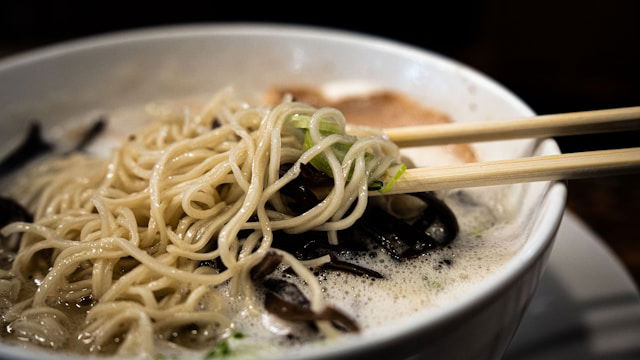Eating ramen often may come with unexpected dangers, according to new scientific research that connects this beloved dish to a higher risk of early death. The findings, published in the Journal of Nutrition, Health and Ageing, reveal a concerning link between frequent ramen consumption and increased mortality. Though ramen is adored worldwide as a quick and comforting meal, experts are now urging people to be more cautious about how often they enjoy it.

Researchers from Yamagata University School of Medical Science in Japan followed the health of more than 6,500 people to study the effects of eating ramen often. Among them were 2,361 men and 4,385 women, all aged 40 or older when the research began. Over several years, scientists carefully recorded their eating habits to see how ramen frequency might influence long-term health outcomes.
To identify patterns, the participants were divided into four groups based on how often they ate ramen. The categories included people who ate it less than once a month, one to three times a month, once or twice per week, and three or more times per week. This clear structure allowed scientists to compare the effects of eating ramen often with those who consumed it rarely or occasionally.
The dish that became the focus of this research is ramen, a comforting bowl of noodles served in a flavorful broth. Typically pork-based and heavily salted, ramen is often topped with slices of meat, seaweed, and vegetables. Although ramen began as a traditional Japanese comfort food, it has become a global phenomenon. Its popularity has grown rapidly across countries like the United States, the United Kingdom, and Australia. However, the recent study has cast new light on the potential health consequences of eating ramen often.
Despite its comforting appeal, researchers now warn that consuming ramen frequently can carry serious health risks. The findings suggest that the more often people eat ramen, the higher their chance of facing harmful effects related to sodium and poor diet balance.
The results were especially revealing. About one-third of all participants admitted to eating ramen weekly. Younger men turned out to be the biggest consumers, and researchers noticed that many of them also smoked, drank alcohol regularly, and struggled with weight issues. These combined lifestyle factors appeared to worsen the negative outcomes associated with eating ramen often.
During the follow-up period of about four and a half years, the study recorded 145 deaths. Of those, 100 were due to cancer and 29 were caused by heart disease. The numbers showed that men under the age of 70 who ate ramen three or more times per week faced a significantly higher risk of early death compared to those who ate it less often.
Scientists believe the reason behind this connection lies in ramen’s high salt content. Ramen noodles and broth are packed with sodium, and eating ramen often means consuming far more salt than the body needs. Excess sodium can increase blood pressure and cause serious health conditions such as stroke and gastric cancer. Over time, this can explain why frequent ramen eaters may face a higher risk of early death.
The study also revealed an important link between ramen and alcohol. Participants who ate ramen frequently while also drinking alcohol had an even higher risk of death. Researchers suggested that sodium-rich foods, when paired with alcohol, may intensify dehydration and place additional stress on the cardiovascular system. In short, the habit of eating ramen often, especially with alcohol, creates a dangerous combination.
Interestingly, the risks were not limited to the noodles alone. People who consumed at least half of the salty broth faced even greater health problems. Many ramen lovers tend to finish the soup for its flavor, but doing so drastically increases sodium intake. This habit, combined with eating ramen often, multiplies the health dangers identified by the study.
Although these findings are serious, researchers clarified that the study was observational. This means it cannot definitively prove that ramen directly causes early death, but it does show a strong and consistent link. Scientists emphasized that while eating ramen often is associated with higher mortality, more research is needed to understand the exact mechanisms behind it.
The authors summarized their findings by noting that ramen is widely consumed in Japanese communities, and heavy ramen intake is connected to multiple health issues. They concluded that frequent ramen consumption, particularly among men under 70 who drink alcohol and finish most of their soup, appears tied to a higher mortality risk.
From a nutritional perspective, ramen is far from a balanced meal. It delivers plenty of carbohydrates and fats but lacks essential nutrients like fiber, vitamins, and protein. Eating ramen often can therefore disrupt a healthy diet and contribute to long-term health problems. In particular, the lack of nutrients and the excess of sodium create a combination that may lead to hypertension, obesity, and other metabolic complications.
Even though it carries these risks, ramen remains deeply rooted in modern culture. Its affordability, taste, and convenience have made it one of the most popular fast meals in the world. Yet this global love affair with ramen needs a more balanced approach. Health experts encourage moderation and mindful preparation rather than complete avoidance.

Small changes can reduce the dangers of eating ramen often. Choosing a broth with less salt, skipping part of the soup, or adding fresh vegetables can make the dish healthier. Some people opt for homemade ramen, where they can control ingredients and sodium levels. Others replace instant noodles with fresh versions or add eggs and lean protein for better nutrition. These adjustments can help people enjoy ramen without exposing themselves to unnecessary health risks.
The study also sparked discussions about instant ramen, which is widely available and often much higher in sodium and preservatives than fresh ramen. Since millions of people worldwide consume instant noodles daily, the concern about eating ramen often becomes even more important on a global scale.
Experts believe awareness is the most effective solution. When consumers understand what is in their food, they can make smarter choices. Occasionally enjoying ramen is unlikely to cause harm, but making it a regular habit, especially with alcohol or processed ingredients, may lead to serious consequences over time.
The ongoing discussion about eating ramen often serves as a reminder that moderation is key to good health.
Many comfort foods, while delicious, become harmful when consumed too frequently. Ramen is no exception. It represents how easily convenience and taste can overshadow long-term wellness when not balanced properly.
In conclusion, the study highlights a critical connection between ramen and early death that should not be ignored. Eating ramen often might feel harmless, but the cumulative effects of high sodium and poor nutrition can be severe. Moderation and mindfulness are essential for anyone who loves ramen but also values their health.
The message is not to fear ramen but to treat it as an occasional treat rather than a daily staple. Enjoying it once in a while is safe, but making it a frequent habit could bring unintended health problems. By understanding this balance, people can still appreciate the comforting taste of ramen while protecting their long-term well-being.
As scientists continue to study the effects of ramen consumption, one lesson remains clear: the way we eat matters as much as what we eat. Eating ramen often may be tempting, but making conscious food choices is the real key to living longer and healthier.
